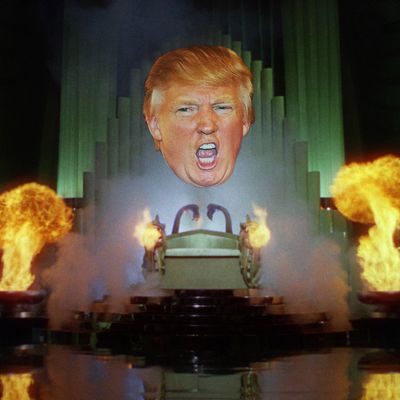
Donald Trump’s refusal to release his tax returns could be seen as a process issue, perhaps even a vetting question so important that it’s “disqualifying,” as Mitt Romney has called it. But perhaps it could be something more than that. It might be the thin end of the wedge that opens up a powerful theme against the self-professed billionaire: that Trump is a total fraud.
Trump has repeatedly refused to publish his tax returns, and repeatedly lied about his intention to do so. He promised five years ago to release his returns when President Obama released his birth certificate, and reneged. He promised to release them in February 2015; again promised to do so last fall and then in January, then backed off on the grounds that he was under an IRS audit, an argument tax experts have unanimously dismissed as nonsensical. Now he insists there’s “nothing to learn from them.”
As many financial reporters have speculated over the years, based on whatever fragmentary information Trump has provided, he almost certainly has far less money than he claims. A reporter who has dug into the question estimates Trump’s actual worth at $150–250 million; Trump claims to be worth $10 billion, which is at least 40 times the journalist’s estimate. The reality of Trump’s business career is that he is not so much a great businessman but somebody who has figured out how to make money by convincing people that he is one.
There’s a line I vividly recall from the 2004 election, though I can’t find it online. An adviser to George W. Bush’s campaign explained why it was so focused on discrediting John Kerry’s character. You don’t shoot down every fighter plane launched against you, he said, you blow up the platform they’re being launched from. It’s a mistake to assume any particular political tactic works in all cases, but this approach seems to suit Trump especially well. The particulars of his day-to-day message, to the extent he has one, barely matter. His entire appeal rests on the bedrock of his identity as a successful entrepreneur. The vast wealth Trump claims to have amassed allows him to supposedly fund his own campaign, escaping the influence of fundraisers who control his opponents. His alleged deal-making skill explains why he will be able to improve every trade deal, solve every legislative impasse, and finesse every diplomatic conflict. Trump’s endlessly repeated proposition is that he will take the skills that made him so rich and generously use them to make the country rich. Without that, he’s just a dumber version of Pat Buchanan.
The key thing Hillary Clinton’s campaign should understand is that it does not have to handle this question the same way journalists do. A reporter can raise questions about Trump’s wealth, but that is as far as it can go, or else Trump will sue. Clinton doesn’t have to be held back like this. She can simply assert that Trump is lying. She can say, as all the publicly available evidence suggests, that Trump is worth a mere fraction of what he says, heavily indebted, and turning to Republican fundraisers because he doesn’t have anywhere near enough money to fund a general-election campaign. (Trump, in fact, has spent a mere $317,000 of his own money, the rest of his spending coming from loans he can recoup through fundraising.)
The same principle holds true of Trump University. The whole enterprise is very likely a fraud, operating under the same principles as his candidacy — Trump’s promising to put his financial genius at your disposal. Trump is being charged with actual fraud, and he successfully persuaded a judge to delay the trial until after the election. But Clinton has no reason to defer to the legal uncertainty this delay gives Trump. She can assert that he is a fraudster, and, if Trump protests, then he can agree to move the trial up in order to clear his name.
In a court, if you can exclude the relevant evidence, you can maintain the presumption of innocence. Journalism operates under somewhat similar lines — a reporter can speculate on the basis of absent evidence, but can’t assert a firm conclusion. Politics doesn’t work like that. Trump is a fraud — a charge he wants to deny on the basis of evidence he refuses to disclose — and he should bear the presumption of guilt.






























